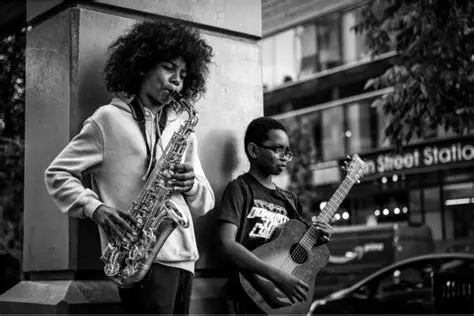In today’s Nigeria, the dream has changed. Once, stability meant a corporate job, a neat résumé, and a life built on predictability. Now, that dream is fading. The new ambition glows in studio lights, behind phone cameras, and on digital stages. For many young Nigerians, creativity has become both a calling and an escape a way to rewrite stories in a country that often gives little room for expression or opportunity.
Music has become one of the most visible symbols of that shift. Afrobeats isn’t just entertainment anymore; it’s hope in motion. It represents a path where talent can triumph over structure, where one viral moment can flip a life. In a country where unemployment numbers stay high and systems often fail to reward diligence, many youths have turned to art not just to survive, but to feel alive. The sound of new artists coming out of Lagos, Port Harcourt, Benin, and Abuja tells a story of a generation that’s learned to create their own economy through creativity.
I see it everywhere friends leaving formal jobs to chase content creation, producers turning their bedrooms into studios, photographers turning moments into brands. Even those who still hold 9-to-5s now crave side hustles rooted in creative work. Music, in particular, carries a sense of freedom that other industries rarely offer. It’s expressive, global, and unpredictable a space where one’s background doesn’t always define one’s ceiling. And for many Nigerians, that freedom is the ultimate luxury.
There’s also the collective energy around it. When someone from your neighborhood makes it big, it feels like a personal win. Burna Boy’s Grammy, Rema’s global run, Asake’s meteoric rise these stories fuel a belief that success is no longer confined to degrees or corporate hierarchies. They prove that creativity isn’t just a dream; it’s a viable export. Music is now one of Nigeria’s biggest cultural currencies, commanding respect from industries that once looked down on it.
But there’s more to it than fame or money. For a lot of young Nigerians, the creative route is a form of therapy. The daily realities economic strain, social pressure, limited opportunities weigh heavily. Music and art offer escape, but also meaning. When you create, you take control of your story, however briefly. You build something that reflects how you feel when nothing else seems to make sense. That’s powerful. It’s why you’ll find so many upcoming artists singing about struggle, hustle, and hope. They’re not just performing; they’re surviving.
Still, this creative wave comes with its own complications. Not everyone who chooses art finds stability. The industry can be unkind full of exploitation, inconsistency, and emotional highs and lows. The romantic idea of “making it” often hides the grind beneath it: unpaid gigs, ghosted promises, endless self-promotion. Many artists burn out before their first break. Yet even with the risks, the drive persists, because the alternative stagnation feels worse. In a system where progress moves slowly, creativity feels like movement, even when it’s uncertain.
What’s fascinating is how technology has become both the bridge and the amplifier. Social media has flattened the hierarchy. You don’t need industry approval to share your work anymore; you just need attention. That accessibility has empowered creators but also increased competition. Everyone is a brand now the dancer, the producer, the skit maker, the stylist. It’s both liberating and exhausting, but it reflects a collective truth: Nigerians are done waiting for validation from broken systems. They’re building their own.
There’s also a deep cultural element to this. Music has always been part of Nigeria’s DNA from traditional drums to Fuji to the evolution of Afrobeats. What’s happening now isn’t a new phenomenon but a reclamation. Creativity, once dismissed as unserious, is being recognized as a legitimate form of progress. Parents who once scolded their children for wanting to make music now proudly share their performances online. The perception of success has expanded, and that shift may be one of the most profound cultural changes of this generation.
From my perspective, this movement says something larger about identity. Choosing creativity isn’t just about chasing fame it’s about choosing self-definition. It’s saying, “I want to build something that feels like me.” That’s why so many Nigerian youths are betting on art, even when the odds aren’t friendly. It’s not rebellion for rebellion’s sake; it’s reclamation. The system may not reward creativity equally, but for many, it’s the only space where they feel seen.
Music, especially, embodies that paradox beautifully. It’s both an escape from the chaos and a mirror of it. The same Lagos traffic that frustrates someone might inspire another’s verse. The same power outage that ruins a studio session might birth an acoustic freestyle that goes viral. That’s what makes Nigerian creativity so powerful it thrives in imperfection. It doesn’t wait for perfect conditions. It adapts, bends, and transforms struggle into rhythm.
In the end, I think this turn toward creativity says something hopeful. It means people are still dreaming, still building, still trying. It means that even when the system fails, imagination hasn’t. The music, the art, the storytelling they’re all ways of saying, “We’re still here.” And that’s what makes this generation special.
For Nigerian youths, creativity isn’t just a career path. It’s a protest, a language, a sanctuary. It’s the one space where limitation doesn’t dictate destiny. And maybe that’s why, despite the odds, the sound keeps growing louder because in every beat, there’s a heartbeat.


Leave a Reply